A mass of children pile through the front door. They are hot, tired and hungry. And so are their parents. As I rush to organise lunch, I turn to see my potty trained daughter standing in a puddle. I am so frustrated that I want to scream but I know that won’t help.
Inside: Potty training regression is common, but what causes it and what can you do about it? Dr Orlena Kerek explores the main causes of regression and gives handy hints to get through this frustrating time.
Potty training regression is very normal. Children are so used to doing wees and poos in their diapers that they easily just revert back to their old ways.
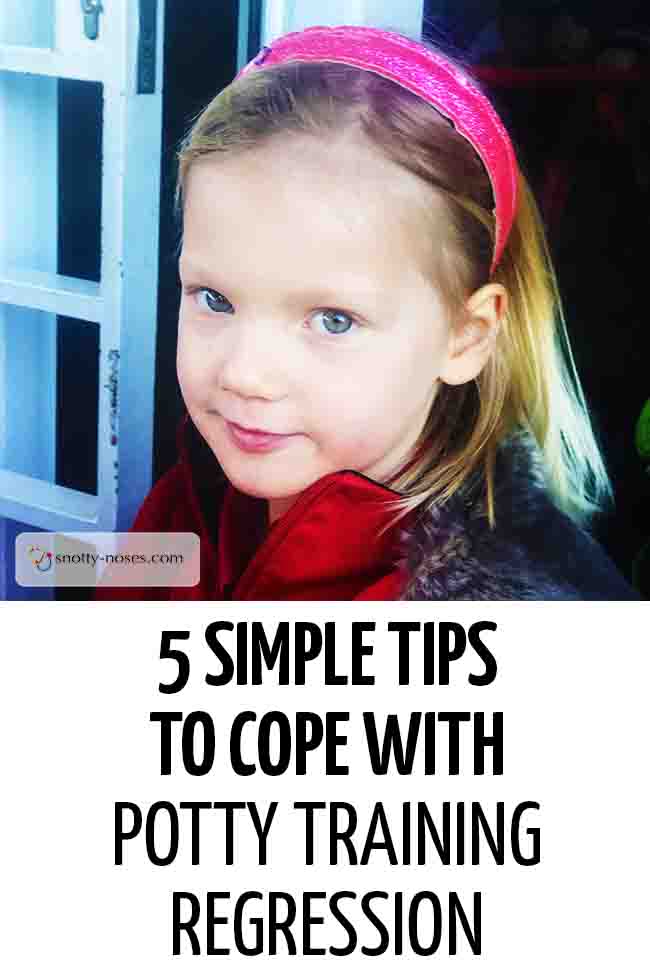
The Most Common Cause of Potty Training Regression
Normally potty training regression is just a blip.
It doesn’t mean anything other than their minds are otherwise occupied. (Clearly it's more interesting playing with your truck or watching tele than going to the bathroom!)
It's just that kids are busy being kids and going to the toilet is right down at the bottom of their list of priorities.
But at times, potty training regression is a sign that something more serious is going on.
More Serious Causes of Potty Training Regression.
UTIs in Children
Related: How to Teach Your Child To Wipe Their Bottom
Urinary Tract Infections are common in children. They are much more common in girls than boys. If your child has a UTI they are likely to need to go to the toilet frequently, with small amounts of wee rather than big wees. They may also complain of pain or tummy ache.
You may see blood in their wee.
They may have a fever and be vomiting.
If you are worried that your child has a urinary tract infection, you should take them to the doctor.
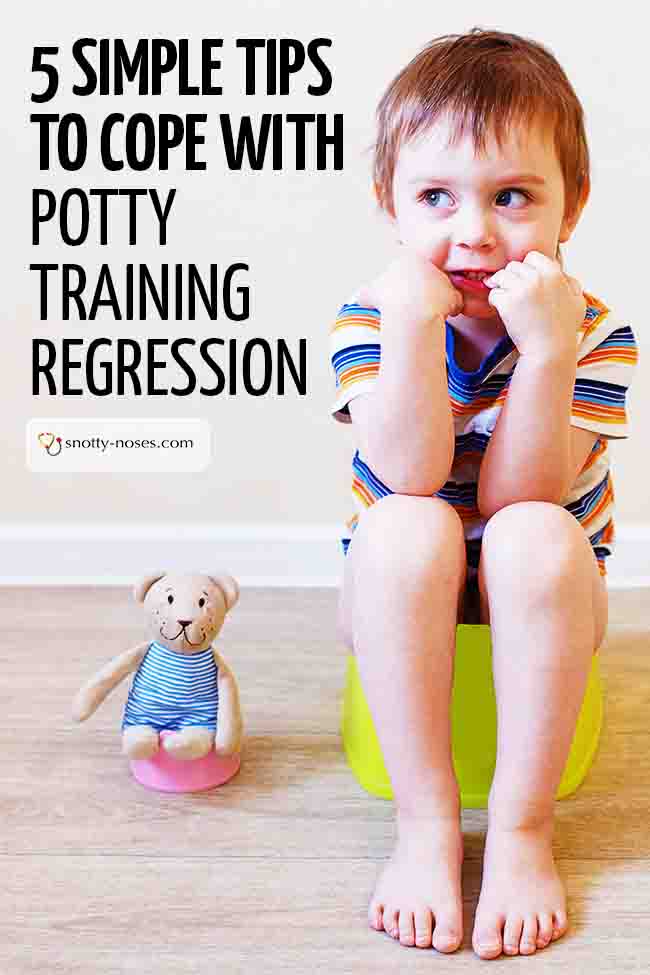
Signs of UTIs in Children.
- Doing small, frequent wees.
- Pain when doing a wee
- Blood in the urine
- Fever and Vomiting
Constipation in Children.
Related: Constipation and Natural Stool Softeners for Kids
Constipation is when you don’t poo frequently enough and your poo is too hard. Constipation in kids is very common (normally because they don’t eat a healthy diet).
Constipation can cause UTIs, tummy aches and potty training regression as the hard poo is pressing on the bladder and stops it from emptying completely.
Pain in Children.
Pain is another cause of potty training regression.
It may be pain when doing a wee or a poo, such as a UTI, or having a small “fissure” or cut on your bottom (this sounds very horrible but can be caused by doing a big hard poo.)
Other pains that aren’t directly related to going to the toilet may also cause accidents as they distract the child.
A tummy ache due to a different cause could present as potty training regression.
Related: 10 Things Most Kids Don’t Know About their Mother
Emotional Problems Can Cause Toilet Regression.
Emotional problems such as a change in the routine or a big event such as a pregnancy, arrival of a new sibling, parents splitting up or the family moving house.
Even things that don't see like an issue to use may be causing your child to be preoccupied.
These big life changes can have profound effects on little people.
Other Medical Problems That Cause Potty Training Regression
Very occasionally potty training regression can be due to other medical problems such as a problem with your child’s urinary tract or their nervous system.
These problems are rare and are normally present from birth so don’t normally present as “potty training regression” but it is possible that you thought they were fine and actually they weren’t.
Or very very rarely that a neurological problem has evolved.
Related: Help! My Toddler Won’t Eat
Related: How to Get Your Toddler To Sleep Independently in 5 Easy Steps
Signs and Symptoms of Worrying Potty Training Regression
- Constant dribbling of urine.
- Developmental regression (not being able to do things that they previously could).
- Decreased sensation in their legs or around their bottoms.
- Stumbling or clumsiness beyond what is normal for their developmental stage.
What Can You Do About Potty Training Regression?
- If you are happy that your child has “normal” potty training regression, be positive, don’t scald them, just encourage them to use the toilet like a big boy or girl.
- If you are worried that your child is suffering from a medical cause, such as a UTIs, pain, constipation, a neurological or urological problem, then you need to go and see your doctor.
- If you think your child is suffering from potty training regression due to an emotional issue, you need to work out what the problem is.
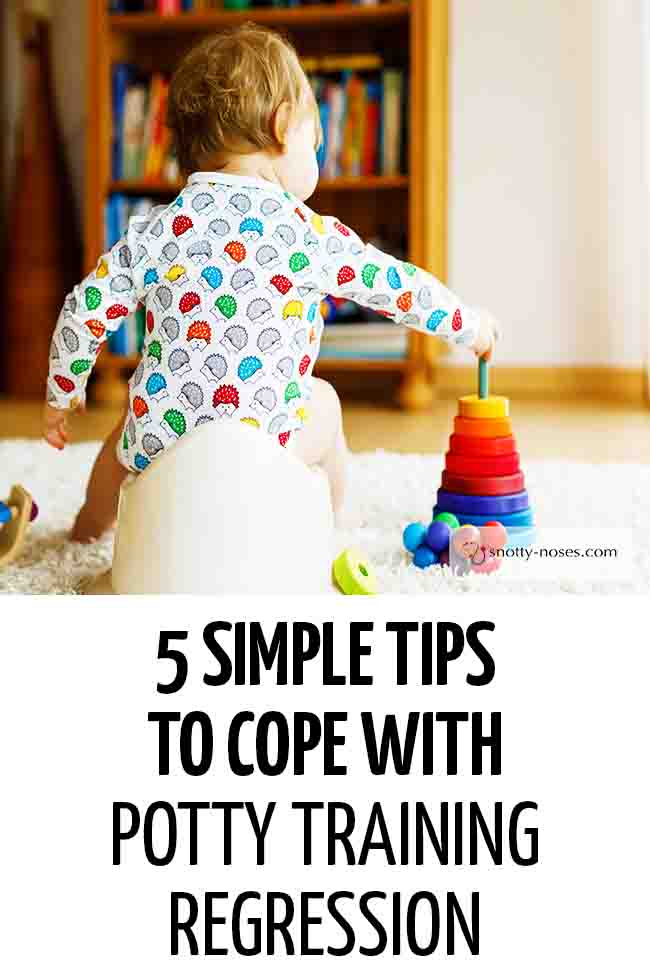
How to Deal with An Emotional Cause of Potty Training Regression
If you have a very anxious toddler, I recommend checking out Natasha’s courses at Anxious Toddlers.
Toddlers and young children are sensitive to their emotions as well as the emotions of the people they are in close contact with.
If you are having a hard time at work, if you are stressed and worried about money, it might be that your toddler is picking up on your emotions. Big events and big changes, whether they are happy or sad, will upset their daily routine and their feeling of security.
Identify the Problem. It may be that when you stop and think, you know what the problem is. But you may need to talk to them and ask them what the problem is.
I know that my oldest used to have accidents when he first started going to school. He was only 3 and found school scary at times. He also didn’t like using the toilets that were open so that everyone could see him using them. Listen to what your child has to say.
Sympathise. Tell your chid that you understand and that these feelings are normal.
Do What You Can to Fix the Problem. It may be that there is a simple solution. Gradually I helped my son get used to using the toilet at school. (OK, I bribed him. If he used the toilet at school, he was given a little non edible treat as a reward for being so brave.)
It may be that there isn’t an obvious easy solution. Perhaps grannie is unwell in hospital and you can’t make her better. But you can spend time visiting her and drawing cards to show her you love her.
Give clear Instructions. Patiently explain to your child that big people do their wees and poos in the toilet and that’s where they should do them now. Give them some positive reinforcement such as a hug or cheer when they do manage to go successfully or get home without an accident.
Continue the Routine. If your child has potty training regression due to a big family event such as a divorce or moving house, try to maintain the routine as much as possible. Children feel safe when they know what is coming next. Routine is very important to young children.
Show Your Kids You Love them.
Whatever the reason for your child’s potty training regression, they will realise that their accidents are having a negative effect on you.
Show them that you love them and don’t blame them for their accidents. They are just learning.
Related: How to Stop Kids Preferring Snacks to Regular Meals
How Long Does Potty Training Regression Last?
Most potty training regression doesn’t last long. If it goes on for longer than a month, it may be that they weren’t ready to potty train in the first place.
Luckily for us, my daughter’s potty training regression was just one of those things. We concentrated hard on helping her go to the toilet before she had an accident.
A few weeks later, when everyone got home at lunch time, we’d all be cheering and clapping and tell her what a grown up girl she was to have made it to the toilet before she had an accident.
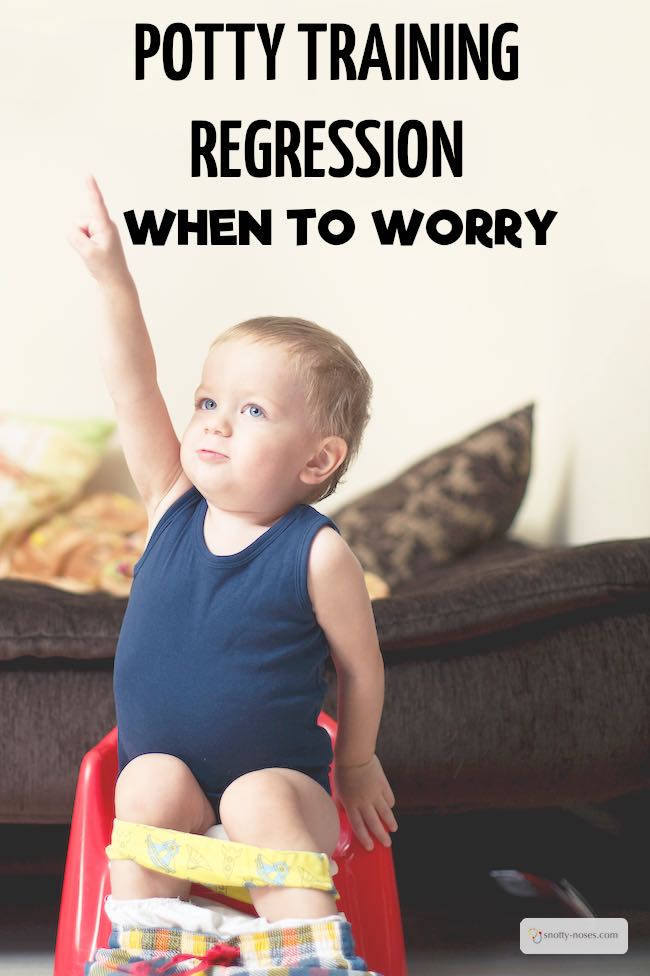
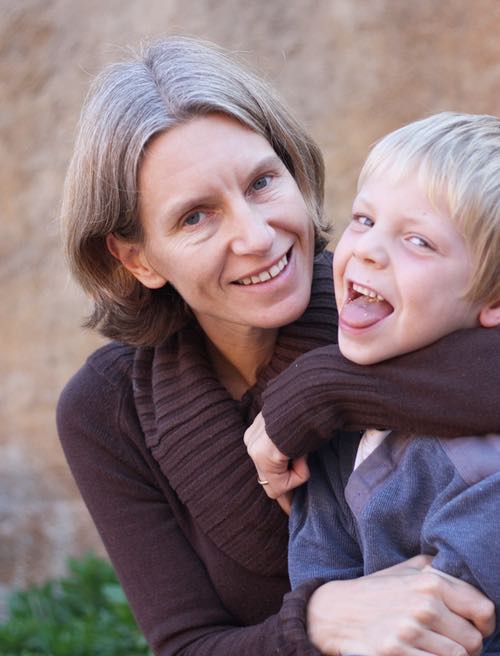
 Feeding Toddlers.
Feeding Toddlers. Would you like your kids to eat more healthily? Check out the book!
Would you like your kids to eat more healthily? Check out the book!